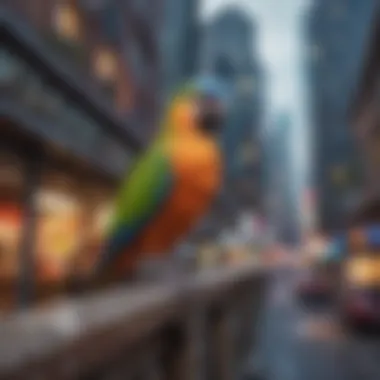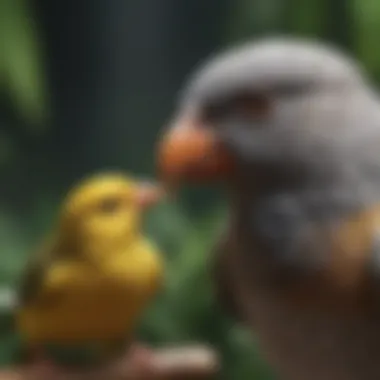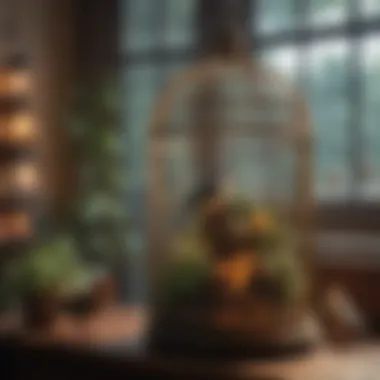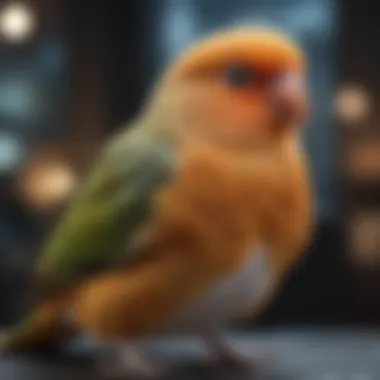Understanding Pet Bird Regulations in Singapore


Intro
Keeping pet birds a pursuit full of joy, learning, and responsibilities. Particularly in Singapore, a city known for its stringent wildlife regulations, one must understand the specific rules governing the ownership of pet birds before embarking on this journey. Singapore is committed to protecting its biodiversity while also allowing residents to engage with bird-keeping responsibly. Thus, aspiring bird owners must navigate these regulations and fit them into the island city’s urban landscape.
Whether you are attracted to birds for their beauty, song, or companionship, the layers of care, legal implications, and ethical considerations deserve substantiated understanding. This article will guide you through the essential aspects of pet bird ownership in Singapore. Not only will it cover regulations concerning species allowed, but it will also enhance your knowledge of avian care, health considerations, and socialization tips to promote a harmonious life with your feathered friends.
Avian Care Basics
Having a pet bird means committing to an entire ecosystem of care that involves understanding different needs specific to various bird species. Their welfare directly reflects on bird owner responsibilities. Here are key elements regarding avian care:
Importance of Proper Nutrition
Feeding your bird the right diet can vastly impact its health. Each species has unique dietary requirements. Generally, a blend of fresh fruits, vegetables, high-quality seeds, and pellets forms the base of a balanced diet. Improper nutrition can lead to health issues. Some basic examples of safe foods include spinach, carrots, and apples. However, not all foods are suitable, and it is essential to research which ones to avoid, like avocado or chocolate.
Understanding Bird Species and Their Needs
Diverse species vary significantly in habits, social behaviors, and personalities. Researching your specific bird type enables you to understand its care needs, optimal social interactions, and integration into your household. Budgerigars, lovebirds, and conures are among the popular choices, each bringing a unique demeanor and care routine.
Basics of Birds Habitat Setup
Creating a safe and lively environment is critical. A proper cage that allows space for movement and flight, comfortable perches, and toys enhances their living area, while mirrors or natural daylight can provide stimulation. It is important to ensure that the setup is both secure and easily cleanable, contributing of healthy living space.
Grooming and Hygiene Tips
Regular grooming helps maintain your bird's health. For instance, by offering regular baths or misting your pet, you enrich its life. Nail trimming and feather care will also prevent complications. Periodically checking for dirt or easy growth can also keep you tuned to their hygiene.
Interacting with Your Pet Bird
Building a relationship with your bird is as crucial as technical care. Different avenues enhance such connections:
Building Trust and Connection
Engagement is key to developing trust with your feathered companion. Respecting their comfort zones while being consistent with your presence builds confidence. Gradual integration will allow plenty of time for socialization without overwhelming them.
Training Techniques and Tips
Birds are intelligent and can be trained to follow basic commands or perform tricks. Using positive reinforcement through treats or praises fastens this learning process. Consistent session timing allows them exchanges through enjoyable engagements.
Fun Activities for Bird Owners and Their Birds
Engaging your bird does not need to be limited to feeding. Different activities such as exploring interactive toys, puzzle-solving exercises, or supervised outdoor flight can break monotony. Look for them to be active participants, and it is indispensable to allocate quality interaction time in the day.
Recognizing Bird Cues and Behaviors
Being attentive to your bird's body language adds understanding of its well-being. For example, if your bird appears fluffed up or is avoiding social interactions, it could be feeling stressed or unwell. Monitoring daily expressions gives cues for health management or behavioral adaptation.
Emotional Well-Being of Birds
Given that birds are social creatures, their emotional state is often linked to their overall health and ability to thrive:
The Role of Play and Socialization
An enriching social environment involving interaction and natural behaviors eases pressures. Outlining a set aside playtime each day enhances mood stability and confidence extraction. Interaction with various individuals also boasts numerous social skills.
Enhancing Birds' Emotional Health
Incorporating both social interactions and toys maintain mental health, offering challenges that hold their interest helps prevent boredom. Bird aviaries provide a glimpse into a more natural living environment suited to different species' social needs.
Assessing Bird Stress and Remedies
Identifying distress through behavioral cues includes feather plucking or incessant vocalization. Remedies can include space or alteration of routine—but extreme behaviors warrant examination from a specialist.


Building Strong Human-Bird Bonds
Frequent touch and conversation deepens connectivity over slow periods of adaption. Regularly, emphasis on these bonds makes a profound difference in building a homes society where bird rejoices.
Bird Health and Safety
Preventative measures reduce the risk of health dilemmas:
Common Health Issues and Prevention
Aware owners promptly identify common health issues such as beak deformities, feather loss, or respiratory problems. Early signs allow for nipping concerns at behavioral stages, ensuring intercessions extend toward medical relevance.
Routine Veterinary Care
FAQ generally recalls regular avian vet visits imparts aspects of maintaining vaccination records. Awareness of age-related issues permits healthy aging concessions and rectification protocols nearing purification.
Environmental Hazards to Avoid
Bird-proofing areas reduces household hazards. Avoiding situations risks injuries from open windows or exposed electrical wires should remain high on the priority list.
Signs of Illness or Distress
Symptoms exhibiting lethargy resource identifiable factors towards active lifestyles or heavy consultations with veterinary specialists. Diligently spotting openness as your commitment do not overlook maintenance serenely.
Fun Facts and Quirky Insights
Exploring the unique aspects of birds often invites enthusiasm:
Unique Traits of Popular Bird Species
Each species possesses unique traits winning different bird ie. African Grey parrots showcase impressive mimicry skills. Similarly, Macaws showcase visual exuberance showcasing charm built rapport since generations.
Historical and Cultural Significance of Birds
Birds retain an essential function preserving nature's balance regarding pollination or pest control. Our healthy habitats stem cultural value toward incorporating avian optimism into societies across time.
Famous Bird Owners and Their Stories
Prominent figures often indulge in their fascination with birds. Examples accruing from cherished publicity keep in public view through musings, marrying bonds of human experience alongside witnessing them fly enhances emotional relevancy for varied societies.
Understanding the complex layers governing pet birds in Singapore combines great reward with empathy. Alongside observing the regulations guarding these beautiful creatures, suitable care and responsible ownership unify bonding experience within their soulful adventuress.
Preamble to Pet Birds in Singapore
Bird ownership in Singapore encompasses a rich tapestry of culture, responsibility, and regulatory compliance. Understanding the fundamentals of pet birds allow prospective owners to appreciate their role in both personal lives and the broader ecosystem. As urban settings such as Singapore increasingly prioritize wildlife protection and aesthetics, educating potential owners about the regulations and implications becomes essential.
Overview of Avian Diversity
In Singapore, avian diversity presents a striking visual portrait of rich species that dwell both naturally in the wild and are maintained as pets. Species such as the budgerigar, cockatiel, and lovebird stand out as popular choices for many pet owners. Beyond these common species, the country also permits a range of exotic birds that contribute to a vibrant pet bird culture.
Maintaining a balance between native and non-native birds is crucial. Singaporean regulations reflect a need to honor historical avian significance while monitoring the ecological impact. While many domesticated species are welcomed in living environments, certain migratory and indigenous birds face strict legal standards.
Cultural Significance of Birds
Birds have long held a place in the heart of Singaporean culture. They symbolize beauty, freedom, and in some instances, bring prosperity. Traditional practices involving birds often interlace elements of local lore and societal practices. For instance, many residents participate in bird-singing competitions, raising awareness about specific species, which plays a significant role in fostering community interaction.
Thus, navigating pet ownership in Singapore predicated on its culture promotes a greater understanding of the dynamics involved. Pet birds evoke a sense of companionship while encouraging environmental mindfulness. Respecting regulations that enforce conservation initiatives connects the ownership experience with collective heritage and environmental responsibility. It’s this very framework that guide future bird owners towards a sustainable relationship with both their pets and nature at large.
Regulatory Framework
The regulatory framework surrounding pet birds in Singapore is an essential component for prospective owners and stakeholders within the avian community. The legal guidelines not only dictate the species that can be kept as pets but also outline the responsibilities associated with ownership.


Understanding these regulations is crucial, as they serve to protect not only the birds themselves but also the environment and society as a whole. The regulations are designed to ensure that the pet bird market operates ethically, reducing the risk of wild systems disruption and promoting responsible pet ownership.
Legal Status of Pet Birds
In Singapore, each type of pet bird has a specific legal standing. Authorities outline a clear distinction between native wildlife and commonly owned species. This framework prevents the potential risk associated with owning birds that may threaten local ecosystems if they escape or are released into the wild.
The legal status protects certain species from being traded or owned, thereby preserving biodiversity. Avian owners must be aware of what species constitute legal pets to avoid penalties. Knowing local laws also expresses a commitment to ecological balance.
Species Allowed as Pets
Common species permitted
Commonly permitted species often include parrots, finches, and canaries among others. These birds are well-known for their manageable care requirements and specific needs that pet owners can meet reasonably well. Common species, such as the Budgerigar, may also display vivid colors and enticing vocalizations, making them a popular choice for many.
Key characteristics of these species are their sociable nature and ease in breeding in captivity. The advantages are notable. For instance, they provide the potential for delightful companionship and interaction. However, owners must be aware of aspects like longevity and cage space commitments that these species entail.
Endangered species and their restrictions
Endangered species pose quite different challenges. Singapore has established strict limits on ownership to prevent illegal trapping and trade of these vulnerable birds. Owning endangered species is often restricted to licensed breeders and conservationists engaged in rescue and rehabilitation.
The key characteristics include profound ecological importance, sometimes being part of endangered species programs. These restrictions ensure these birds are less likely to become extinct, emphasizing community responsibilities. Still, prospective owners should note the complexities and challenges these birds offer, including special habitat needs and management considerations.
Permits and Licensing
Requirements for ownership
The requirements for ownership of pet birds are crafted to ensure responsible future owners understand their commitment. Documentation generally involves proof that one is aware of the responsibilities surrounding animal welfare, import regulations, and situational ethics that come with bird ownership.
A key aspect of these requirements relates to the provision of appropriate care, habitat, and companions for the birds. A potential pet owner goes through a careful screening process that reinforces ethical practices. Owners must ensure not only adequate space but also seek veterinary care.
Application process
The application process for obtaining ownership permits is structured and detailed. Prospective owners must navigate a series of steps, including documentation, inspection of intended environments, and approval of care conditions. This process emphasizes the low-risk environment for both the owner's family and the native wildlife.
This application serves an extra role. It encourages ongoing education about bird care and fosters support by engaging new owners in community programs. While the process may seem burdensome, the ultimate goal frames responsible regulations that underline wildlife preservation efforts effectively.
Responsibilities of Pet Bird Owners
Owning a pet bird in Singapore comes with many responsibilities. It is crucial for potential bird owners to understand their obligations before bringing a bird home. Awareness of these responsibilities can enhance the healthy interaction between birds and humans. Bird ownership requires a committed approach to care, attention, and understanding of avian needs.
Basic Care Requirements
Dietary needs
Dietary needs are significant for pet birds. These needs vary among species, but there are common rules. A balanced and nutritious diet will help birds live longer and healthy lives. It is important for pet owners to use high-quality seeds, specialized pellets, and fresh fruits and vegetables to provide essential nutrients.
A proper diet helps in maintaining behavior as well. Some birds can become aggressive or moody if their diets are inadequate. For instance, seed-based diets alone can lead to obesity and other diseases. Therefore, diverse diets are advised as they support good health. A well-balanced diet allows birds to thrive and will reflect joy and energy.
Habitat setup
Habitat setup is another fundamental element of bird ownership. An appropriate cage is needed for the bird's safety and comfort. This cage must be spacious enough for bird movement, and it should include enriching elements. Perches, toys, and climbing areas are essential to promote physical health and mental stimulation.
Proper ventilation and lighting are also key. Birds need natural light for overall wellbeing. An enriched environment is critical because a stagnant habitat can lead to boredom and stress. Thus, when selecting a habitat, consider the specific characteristics of the bird species to ensure optimum comfort and happiness.
Health and Veterinary Considerations
Regular health check-ups
Regular health check-ups should never be overlooked. They are essential for early detection of any health issues. Birds tend to hide illness well until it's advanced. Therefore, routine visits to an avian veterinarian are critical to assess overall health and prevent diseases.
Hookworm and feather plucking are common problems that can be addressed early through health checks. Bird owners must build a trusting relationship with a vet who is knowledgeable about certain kinds of bird species. Early diagnosis means easier and often cheaper treatment plans, ultimately leading to a long and happy life for pet birds.


Common health issues
Common health issues faced by pet birds can vary widely. These may include respiratory infections, obesity, and psittacine beak and feather disease. Recognizing symptoms such as changes in behavior and dietary habits can be key indicators.
Keeping informed about these potential issues can help owners know when to seek veterinary care. Proper education leads to a better understanding of preventative care. Monitoring bird health consistently allows quick action and can minimize long-term problems for owners.
Behavioral Understanding
Social needs of birds
Social needs are a critical aspect of bird ownership. Many bird species are social animals. They depend on interaction not just with others of their kind, but also with human companions. Boredom can affect their mental health, leading to aggression or self-destructive behaviors.
Daily interaction, talking or playing with birds goes a long way in fulfilling their social requirements. Lack of socialization can feel lonely for birds, which is not ideal. Owners must be prepared to show affection and create time for their feathered friends to enhance their quality of life.
Training and enrichment
Training and enrichment stimulate a pet bird's intellect. It involves teaching basic commands and ensuring engaging activities during the day. Training techniques such as positive reinforcement can lead to a well-behaved bird. Providing various activities will prevent restlessness, as an enriched environment allows for exploration.
Enrichment can include puzzles and toys that encourage problem-solving skills. Engaged birds are usually less prone to behavioral issues. Owners benefit as well; bonding time is often increased during training sessions. Thus, a two-fold relationship flourishes, benefiting both bird and owner in the long term.
Successful bird ownership requires dedication, effort, and a thorough understanding of what pet birds need in terms of health, socialization, and care.
Environmental and Social Considerations
Considering pet birds in the context of Singapore's urban landscape entails addressing a complex interplay between various environmental and societal elements. The duties of bird owners go beyond mere companionship; they influence ecological awareness and community bonding. Proper understanding of the challenges indigenous to urban living, real benefits from social connections, and societal perceptions can all enhance the living experience of both the pet and the owner. An informed owner can contribute positively to community perception as well as ecological well-being.
Urban Living Challenges
Space limitations
In Singapore, space can be a significant constraint for pet bird owners. Many residents live in high-rise apartments which offer limited personal space. This condition frequently pushes pet owners to consider species that require less room to flourish. Birds can require a spacious area for flight and to maintain healthy behavior patterns.
The collaborative nature of bird ownership works effectively within this framework. Parakeets or finches, for instance, often emerge as popular choices; their smaller sizes align with available space in apartments while they still provide joy and companionship.
However, cramped living situations raise concerns. Limited space can lead to a lack of stimulation for birds, potentially inducing stress. Thus, owners must be proactive in providing opportunities for movement, which may involve rotating toys or getting creative with habitat designs. In this way, there can be a balance founded on thoughtful planning beyond merely accommodating the space.
Noise and public perceptions
Birds can produce a range of sounds, from charming chirps to potentially disruptive calls. It is essential for potential owners to consider the acoustic implications tied to specific bird species. Communities often host regulations on bird noise that can impact both the owners and the neighbors. Loud species can provoke complaints and deter individuals from considering a pet bird for companionship.
Understanding social nuances is key here. Owners can consider characteristics such as vocalization before choosing to welcome a bird into their home. By selecting quieter breeds, owners can help maintain harmony within their community. Ultimately, it can reflect positively on the individual’s responsibility toward shared living spaces and impressions of bird ownership.
Community and Support Systems
Bird clubs and associations
Local bird clubs serve as focal points for education and hobby-related community interactions. They play a crucial role in sharing resources and organizing events, thereby fostering a cooperative spirit among bird owners. Connecting with fellow enthusiasts allows individuals to discuss their experiences and further understand regulations surrounding pet bird ownership.
These associations often bring birds and owners together for shows or discussions, which can deepen a pet owner’s appreciation of avian-related issues. Networking with experienced birdkeepers can offer insights into care best practices, alongside advocating for responsible ownership that aligns with any legal regulations present in Singapore.
However, one should consider the varying levels of involvement clubs may require. Some offer casual gatherings while others may impose strict membership expectations, thereby approaching from different points based on commitment levels. This factor may influence one’s decision to join a particular association.
Online resources and communities
The rise of online forums and social media provides unique opportunities for aspiring pet bird owners. Platforms such as Reddit or Facebook have proliferated with groups poised to answer queries ranging from species choice to specific care techniques. These resources create an immediate connection to information, enabling individuals to learn through shared experiences.
Such communities allow access to diverse perspectives on pet interaction and well-being from various locations around the world. Owners can engage with others tackling similar challenges, offering morale support during complicated times. While online memberships often bear fewer obligations, three important considerations are the importance of verifying the credibility of the shared advice, ensuring respectful interactions, and regional regulations differing from global recommendations.
End
In summary, understanding the regulations and considerations regarding pet birds in Singapore is pivotal for current and prospective owners. The intersection of cultural values and wildlife conservation creates a rich context for avian enthusiasts. The benefits of responsible bird ownership go beyond companionship; they foster a connection to nature and promote a deeper understanding of environmental stewardship.
It is crucial to recognize the legal landscape connected with owning pet birds. The importance of adhering to species-specific regulations not only ensures compliance with the law but also underlies a commitment to conservation. By choosing species that are permitted, owners contribute to ecological balance, avoiding channeled market pressures on endangered populations.
Thus, navigating through the responsibilities features prominently in this context. Providing appropriate care, including attention to dietary needs and health care, is central for welfare of pet birds. Urban environments pose unique challenges, yet they can also deliver satisfying experiences if manageable expectations are set. Reflections on urban challenges indicate the necessity for careful planning regarding space and social integration, both for birds and owners.
Community engagement enhances the experience of bird ownership. Support structures found in bird clubs or online resources effectively act as not only sources of information but also social support networks for improvement in care practices.
Ultimately, this guide serves to illuminate the commitments associated with being a responsible bird owner. With a precise understanding of the laws, community expectations, and personal responsibilities, the journey of having pet birds can become enriching and fulfilling.















